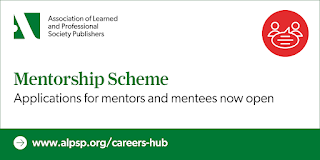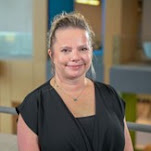Liz Malnar, Clelia Petracca and Martina Sollai, mentees on the 2024 ALPSP Mentorship Scheme
Martina
The ALPSP Mentorship
Scheme came along at the right time for me. At this career stage, I wanted
to dedicate more time to strengthening my network, comparing experiences with
seasoned professionals, reflecting on my choices, and gaining external insights
into my plans.
I value
opportunities to understand publishing from different perspectives, thus in my
application, I tried to convey how my interests were diverse. I admit that somehow,
I was a bit concerned about finding a match who could relate to this – other
careers often look linear from the outside, while mine has been touching on
several sides of the industry so far.
With this
premise, the experience in the scheme was even more rewarding because I found a
great match of views and approaches in my mentor: an expert, caring
professional who loves mentoring early career colleagues and enjoys exploring
the industry, just like me.
Since our
first meeting, I felt energized by our exchanges: the shared process of setting
up goals and reviewing them made me feel empowered to follow up and act.
I have a
great appreciation for the generosity shown by my mentor in introducing me to other
professionals in the industry, which led to interesting and inspiring
opportunities like becoming part of one of ALPSP
Special Interest Groups.
One sentence my mentor told me sums up very well the sense of the ALPSP mentorship experience for me: this is a space for you to take control over things you would like to do for your own professional development.
Liz
I
joined the ALPSP mentorship program because I was relatively new to the world
of publishing, a field that is both dynamic and ever-evolving. I was eager to
expand my professional network and gain a deeper understanding of current
industry trends. The goal was to equip myself with the knowledge and insights
needed to grow and progress in my career effectively.
At
first, I was uncertain about what to expect and felt a little intimidated, but
those concerns quickly faded after our initial meeting. My mentor’s passion and
expertise were immediately apparent, creating an environment that put me at
ease. We developed a strong working relationship through a structured yet
flexible approach that was tailored to my specific needs. Each session offered
practical advice and insightful feedback, making the experience both engaging
and rewarding.
The
focus wasn't on receiving direct answers; instead, I was encouraged to
independently find solutions, fostering a proactive mindset and the courage to
act on my own. This empowering approach now allows me to confidently tackle
challenges and see them as opportunities for growth.
The
tasks assigned were deliberately outside my comfort zone, designed to push me
into new experiences and activities not typically part of my daily routine.
This strategy effectively highlighted areas where I needed further development
while also affirming the strengths I already possessed.
Overall,
this mentorship experience significantly broadened my perspective on the
publishing industry and instilled a newfound confidence in my abilities. I am
deeply grateful for the opportunity to learn from a seasoned professional and
am excited to continue applying these insights as I advance in my career.
Clelia
I came across the ALPSP Mentorship Scheme by chance and, when I decided to apply, I didn’t know exactly what to expect. I was in that odd stage of my career where I did not have an immediate goal to reach nor a clear understanding of my next move. Curiosity prompted me, and I approached this scheme as an opportunity to learn more about the publishing industry and expand my network beyond my usual circle.Filling out the application was an enriching experience itself. It forced me to think of the professional I want to become and how to develop new skills spendable outside my role. Being a better editor and leader is a (never ending) journey -an aspiration rather than a measurable goal-, and I was a bit worried about setting unrealistic expectations before meeting with my mentor.
Starting the programme shucked any doubt and my mentor was extremely supportive from the very first day. We met monthly and talked about all things publishing: our jobs and the day-to-day challenges, our career journeys and the inspiring people we met along the way, how the industry has changed over the years (from dress code to hybrid work and DEI). To me, it never felt like a mentor-mentee relationship: we were peers exchanging ideas and empowering each other in ways we did not expect.
This mentorship scheme is a gift to yourself: a wonderful opportunity to reclaim the time and mind space to focus on what really matters to you.
About the ALPSP International Mentorship Scheme
The scheme aims to connect colleagues across the publishing
industry and provide a wider network of expertise and skills to help foster
development and progression. Open to ALPSP members (as mentees and mentors) as
well as non-members (mentors only), the scheme was the winner of a ‘Most
Impactful Mentoring Award’ in 2024. For more information and to register visit
our website.
The ALPSP International Mentorship scheme is sponsored by Publishers' Licensing Services.
About the Authors
Liz Malnar, Senior Journal Specialist, FrontiersLiz Malnar is a Senior Journal Specialist at Frontiers,
serving as the primary liaison for authors, editors, and reviewers. She
collaborates with them to develop impactful article collections and ensure
successful outcomes at every stage of the editorial process.
Clelia Petracca is Commissioning Editor in Creativity
Studies and Disability Studies at Palgrave Macmillan. At Springer Nature she
also co-chairs the ‘SDG 5 Working Group: Gender Equality’, a company-wide
initiative to support Springer Nature’s goal of becoming the SDG publisher of
choice with internal and external initiatives and partnerships.
Originally a researcher in marine microbiology and
paleoclimate studies, Martina Sollai moved to academic publishing in 2018,
working in content commissioning at Frontiers. After a stint in project
management for marine conservation, Martina returned to Frontiers in 2022, now
focusing on institutional partnerships in the EMEA region.
















